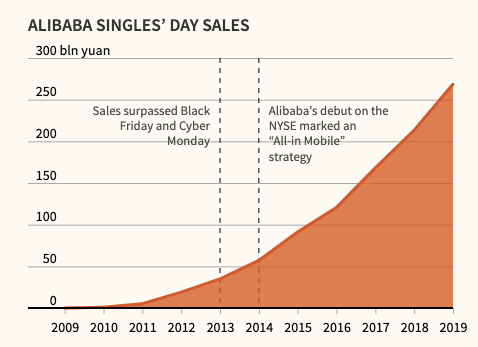Started by a group of four university students in China, Singles’ Day is appropriately celebrated for people who are not in relationships on November 11 every year; 11/11 being a day represented by four singles. It has evolved into one of the largest shopping festivals in the world, with the Jack Ma founded e-commerce conglomerate, Alibaba, crossing twice the combined sales of Black Friday, Cyber Monday and Amazon Prime Day. Such was the frenzy on the 11th edition of Singles’ Day that Alibaba reported sales of $1 billion in the first 68 seconds of the sale and $10 billion in the first half-hour.
Record sales, once again
The 2019 Singles’ Day saw a record $38.4 billion in sales in the first 24 hours itself, more than what Amazon sells on an average month. In comparison, Black Friday, Cyber Monday and Amazon Prime Day raked in around $18 billion together in 2018. Analysts had predicted a lower growth rate due to the overall economic slowdown in China. While the 26% YoY growth in sales was 1% less than that of the previous year, it surpassed expectations with a majority of the customer base waiting for discounts on medium-sized purchases. 1292 million orders were placed through Alibaba’s TMall and Taobao platforms alone, 250 million more than the previous year.

Around 200,000 brands sold their products on Singles’ Day, including 22,000 international brands from 78 countries. The number of new products launched topped out at 1 million. Concerns that American products would be unfavourably regarded by the Chinese in view of the ongoing US-China trade war were dispelled, with Apple and Nike being the top-selling brands. In fact, Apple’s iPhone 11 and 11 Pro received pre-orders to the tune of $14 million. Some of the other top-selling products included Huawei’s new 5G version of the Mate 30 Pro smartphone and apparel from Nike. Electronics, fashion, and beauty products were among the top-grossing categories. Just under 300 brands registered sales of over $14.3 million each, and 15 of these crossed $143 million each. Food supplements were the most popular import product, with companies like Nestle scoring big.
A logistical nightmare
More than 70% of Alibaba’s customers live in smaller cities and rural towns. With an efficient logistics network not being Alibaba’s strong suit, the additional $3.3 billion invested in their logistics unit called Cainiao a week before Singles’ Day seems to have paid off. Having received around 1.3 billion delivery orders, the delivery time has shrunk to under two days from 9 days in 2013. Investments into mobile shopping experiences boosted the figure of purchases on mobile devices to account for 90% of all purchases on Singles’ day.
Other companies like JD.com also began similar events with an 11-day long sale ending on 11/11. Attempts by Alibaba to woo customers like having live gala streamed on social media have been extremely popular. This year, Taylor Swift was the star attraction at the event with Kim Kardashian West launching a Tmall stream that promoted her own line of beauty products. Around 1,000 brands were marketed through live streams.
What's next?
Singles’ Day sales this year has had far-reaching consequences, both literally and figuratively. Alibaba plans to raise up to $15 billion via a sale of shares in Hong Kong this month. The retail giant’s South-East Asian subsidiary, Lazada, racked up 3 million orders in the first one hour while brands like Nike offered discounts on their website in the United States. There was also a shift among customers towards the use of credit cards. In spite of the tremendous numbers, Alibaba co-founder, Jack Ma, felt that the shopping blitz had not lived up to its expectations. He was of the opinion that the hot weather and the fact that 11/11 fell on a Monday, affected sales drastically. He hopes that future editions of the event will have offices granting half a day’s leave.
Interested in retail or pricing? Drop your email here and we’ll get back to you!